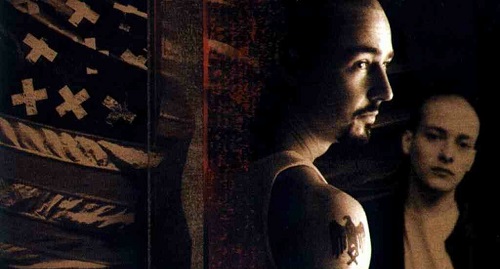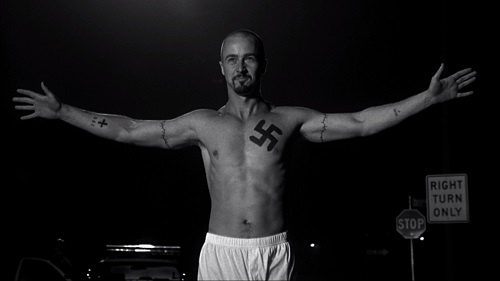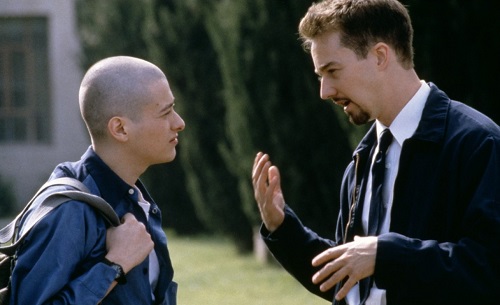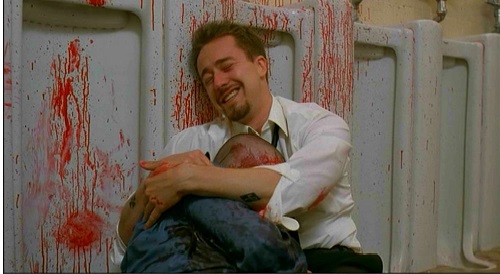American History X (1998)
Dir.: Tony Kaye
Cast: Edward Norton; Edward Furlong; Avery Brooks
***SPOILERS***
Tony Kaye’s, American History X (1998), has been widely discussed and people have argued that it has endorsed racism through glamorisation of the Neo-Nazi culture in America. I’m going to explore both sides and whether or not Kaye’s film insights violence towards the ethnic minorities in America. The glorification of Derek Vinyard (Edward Norton), is what provoked most negative readings on release and people labelled American History X as a work of racist propaganda. More recently however the film has been widely received as an exceptional film scoring high among most viewers. Arguably it could be Norton’s fantastic performance, which he was awarded an Oscar nominee for best actor, that could have manipulated audiences rather than Kaye’s extreme themes that have been ignored by the majority of society. The film is horrific in it’s nature and the racist behaviour and language are completely unacceptable but Kaye has done this for a reason, and why is what I’m trying to explore.
The film begins with Danny Vinyard (Edward Furlong) telling the story of his brother, Derek, who has just been jailed for the murder of 3 black men who tried to steal his truck outside his home. We begin with a black and white scene where Derek is made aware of the burglars by Danny and then precedes to commit homicide as they attempt to get away. From the outset, Derek is glorified, he is making love to his girlfriend, Stacey (Fairuza Balk), which suggests his masculinity and power and then guns down the black men topless whilst bearing a huge Swastika tattoo on his left peck. The explicitness of his racist beliefs is over powering and Kaye purposefully expresses Derek in this way. The question remains, are these racist intentions? All too ironically, Kaye represents Derek in this God-like form much similar to Leni Riefenstahl’s depiction of man in her Nazi propaganda films. Commissioned by Hitler to promote male dominance, Riefenstahl was famous for her use of slow-motion movements, orchestral symphonies and close ups of the male anatomy which can all be seen in Kaye’s own presentation of Derek. Surely, Kaye would be unable to support such fascist believes in a film that will be distributed to millions, does he not have a moral responsibility to not mislead his audience?
Kaye, is so outlandishly advocating Nazi beliefs through his glorification of Derek that it suggests hypocrisy. Is he purely presenting Derek in a satirical manner to overtly suggest his racial ideologies as well as commentating on the ability to manipulate an audience in such a way? We can again see this glamourisation in the Basketball Scene. Derek joins the game to regain the courts back as they play ‘White Vs. Blacks’. It’s a typical sporting scene as Derek joins the game at 6-8. The rousing music as the ‘whites’ are on the offensive and the crowd cheering is all purposefully manipulative by Kaye. One of the black players then elbows Derek which would immediately provoke a response from the audience, depicting the black player as a ‘cheat’ influencing the audience to support the ‘whites’ even though audience members know they shouldn’t. They understand that this type of racial segregation should hold no place in society.
However, all these scenes come before the infamous ‘Curb stomp’ scene, as Christopher Grau argued in his essay, (American History X, Cinematic Manipulation, and Moral Conversion), the audience have been influenced to enjoy Derek’s presence. Yet after the horrific acts he commits are revealed in full in Danny’s flashbacks, the audience question their attitude towards Derek and are repulsed that they enjoyed such a character. Kaye used fascist aesthetics to portray Derek previously which are dangerous techniques but ultimately effective as the audience then hesitate to engage with Derek after his conversion to ‘normality’ once leaving prison.
Derek’s conversion may come too late as Danny, his younger brother, has already been brainwashed by the Neo-Nazi skinhead leader, Cameron Alexander (Stacy Keach), and Derek’s old friend, Seth Ryan (Ethan Suplee). Yet Dr. Sweeney (Avery Brooks), both Derek and Danny’s school principal, attempts to persuade Danny not to go down the same route, and after it becomes clear ‘Sweeney’ has spoke to Derek whilst in prison. They both attempt to help Danny escape the fascist culture he is now involved with. Danny has been indoctrinated with Derek’s pro-Nazi attitude since an early age just as Derek was influenced by their own father, who was coincidentally killed by a black drug dealer. This constant spoon-feeding of Nazi propaganda has set Danny up for a life of racial crime and this is where, I believe, Kaye has allowed himself to present the racist ideologies in a glorified manner through Derek.
Every time the audience are shown a flashback of Derek, through the use of black and white, we are seeing it through Danny’s eyes. So Derek’s racial prejudice is Danny’s perception of his older brother. The God-like image, the strength and brutality and the reasons behind why the audience support Derek can be explained through this theory. Kaye has placed Derek as somebody to look up to just as any brother would to his older sibling, Danny was never a racist from birth, but the continual influence of his older brother has made him a victim of his circumstances. It also becomes clear that when Derek had these racist beliefs, he is rarely presented as being happy. There are many scenes where he is ranting about the degradation of American society, (Immigration Speech, Dinner-table ‘discussion’), but these are all nihilistic outbursts only bringing chaos to the people in his vicinity.
The ending, however is where it loses its substance I believe. As much as I enjoyed the film and the ending as a whole, from a moral message point of view, everything it stands for; the rehabilitation of Derek, his disengagement with the Neo-Nazi’s and the potential reintegration of Danny into society with a better life is eradicated in the final scene. Where does the film go from there? Does Derek then re-evaluate all he learnt in jail and disregard Sweeney’s advice and hunt down the man who shot his brother? Or is it a vicious circle and racial prejudice will never have a solution? A view supported by Washington Post’s, Stephen Hunter, who stated:
“It not only allows its fantasy versions of American Nazis to spew their blackest, cruelest vomitus of hatred but it takes energy and vitality from the electricity of that hatred; then it demurely pretends to disapprove in the last few minutes.” (Stephen Hunter, Washington Post, October, 30, 1998)
I don’t believe wholly with that statement, as I don’t think the film is immoral in its entirety, but his last phrase supports the point that the film loses some credibility in its ability to send a message that opposes racism and everything Derek stands for. It’s hard to suggest what Kaye fully meant to convey in this film and this could be the reason behind his resignation as the film’s director after Norton made final cuts without his consultation. However, I don’t believe the film is immoral, it is simply portraying, to an extreme extent, what can happen if these racist ideologies are broadcast. Especially their influence on the younger generation such as Derek and Danny. Tony Kaye is commentating on society and outlining the problems with this type of exposure to persons who can be easily manipulated, which is why I believe, even though I am completely against the values portrayed in the film, it is not supporting racism but commentating on the dangerous effects this type of prejudice can have.




